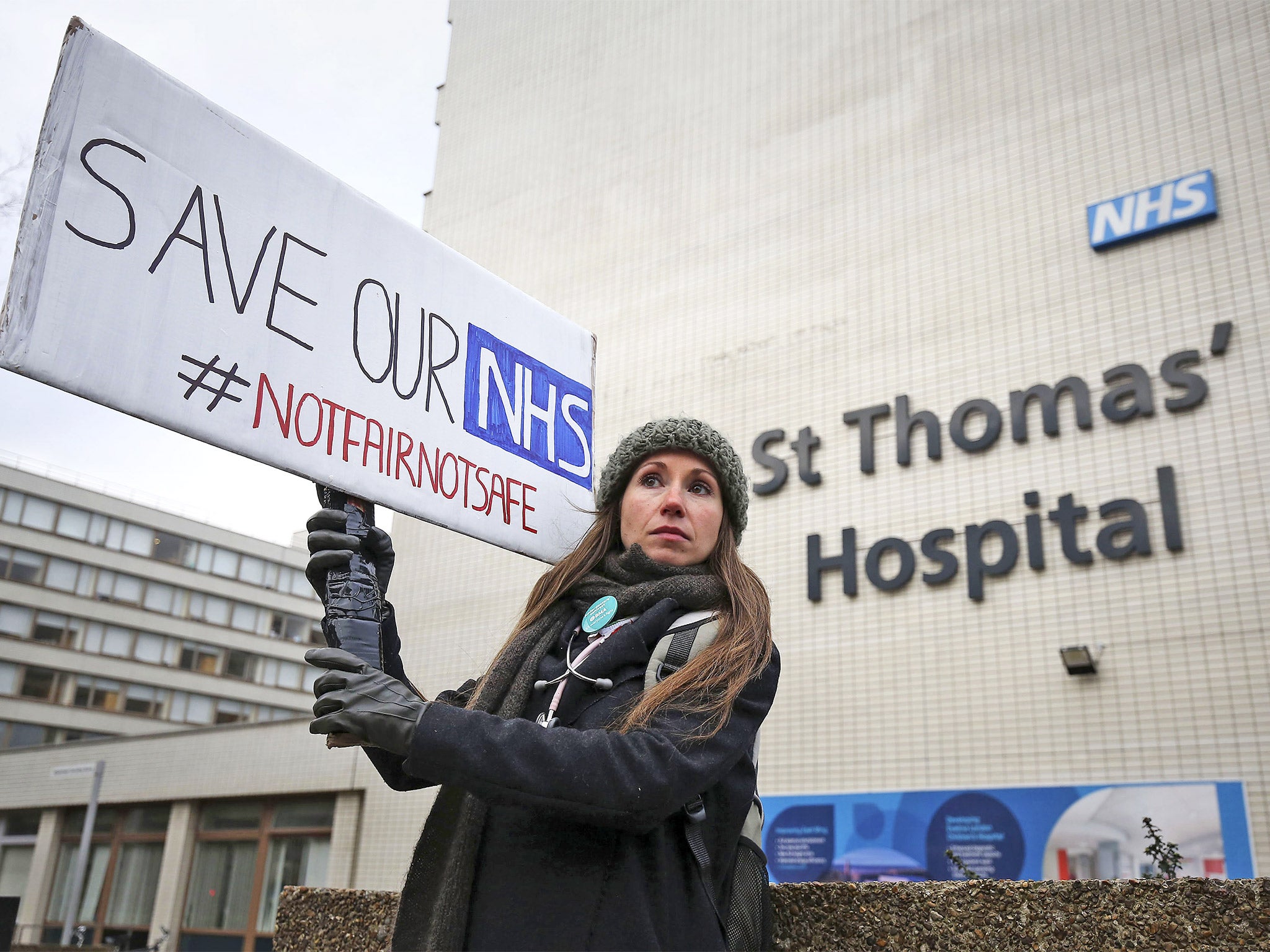Junior doctors' strike: 'We are fighting to save an NHS system we believe in – we think the public understands that'
It is hard to find much anger among patients supposedly most affected by the strike – at least not towards doctors

Dr Naomi Wright didn’t exactly look like your hard-line striking picketer.
Yet here she was, standing in front of the Socialist Worker seller, outside St Thomas’ Hospital in London: a junior doctor without a donkey jacket or bovver boots, but with a stethoscope and a record of voting Tory.
“I voted Tory for the first time last year,” she said, apologetically. “I thought they might help the country as a whole.”
Not a view the 32-year-old paediatric surgical registrar holds now. On Tuesday she was among a crowd of about 150 striking doctors demonstrating outside the hospital, just across Westminster Bridge from the Houses of Parliament.
And if, with their polite smiles and obstetrics-based small talk, they didn’t really act like hardened industrial malcontents, perhaps that’s because they weren’t. The last time junior doctors initiated a major strike over pay and conditions was in 1975.
Dr Wright did at least have a placard. It read: “Save our NHS. Not fair, not safe.”

She began with the ‘not safe’ part.
She regularly worked 25-hour shifts, foregoing breaks because of the nature of the job, “eating while walking and catching two seconds to go to the loo.”
There were few complaints about that. What she feared, however, was that the new contract would “remove the safeguards that prevent managers from making us work unsafe hours.”
Under the current system, hospital trusts can be fined if hours logged by doctors show they were made to work excessively exhausting lengths of time – although in practice many, like Dr Wright, voluntarily ignore their break periods.
Under the new system, the junior doctors claim, there would be a more unwieldy system of reporting exhausting hours to a ‘guardian’ – and the fines money would be kept within the trust, merely being shifted to such allegedly nebulous purposes as improving junior doctors’ conditions and training.

A straightforward loss of cash, the strongest incentive for trusts to avoid dangerously overworking their doctors, would, Dr Wright argued, be lost.
“You could end up working unsafe hours.”
And although called ‘junior doctors’, it wasn’t as if they were fresh out of medical school and just doing simple stuff.
“We’re operating on children and babies. We’re about four years from being made consultants.”

And yes, she did think the pay proposals were unfair. Jeremy Hunt’s offer of an 11 per cent rise in basic pay, she said, came with a significant contraction of what were considered ‘antisocial hours’ attracting higher pay rates. Anything up to 10pm, even on a Saturday, might be considered normal working time.
“The out of hours banding normally represents up to 50 per cent of your pay.
“So if you add 11 per cent to basic pay, but remove much of the 50 per cent, you get a significant overall pay cut.”
And to the mother of a two-year-old daughter, “that would be very damaging”.
“After bills have been paid, I have £200 a month to live on. I don’t have a car, because I can’t afford it. We don’t have extravagant holidays. I am strapped for cash.”
She was, she admitted, contemplating avoiding some of the impact by completing some of her advanced training in New Zealand.

And that was symptomatic of what worried Dr Tom Sanctuary, 36, a respiratory registrar working 13-hour intensive care night shifts.
“We all understand we have to work these hours,” he said, “But it needs to be recognised with a bit of remuneration. If you end up being paid less per hour, for a trust that has no disincentive to make you work a more exhausting timetable, there is a real danger of an exodus of the best doctors. There is a real danger to the next generation of the NHS.”
“We are working in an NHS system we believe in,” he said, “And fighting to save it. I think the public understands that – they see it is as much about them as it is about us.”
Almost on cue, a delighted whoop went up, from a crocodile of primary school children – a novel addition to the occasional supportive hoots from passing ambulances and white vans.
“They’re fighting to save the NHS,” said the teacher to one of her charges.
Among patients supposedly most affected by the strike it was also hard to find much anger – at least not towards junior doctors.
Emerging from a course of radiotherapy, Daniel Stroud, 68, a retired floor layer, offered the wisdom of a resident of the Old Kent Road: “The Government are taking the piss. Because they don’t want to pay ‘em what they’re worth. And they’re already worth a hell of a lot more than they get.”
Views echoed by Makala Burnett, 42, as she emerged from the hospital in a wheelchair.
“The doctors and nurses do amazing work,” she said, “And get paid a pittance.”
She cast a contemptuous eye across the river, at the Houses of Parliament.
“It’s the politicians you’ve got to blame for this.”
Join our commenting forum
Join thought-provoking conversations, follow other Independent readers and see their replies
Comments
Bookmark popover
Removed from bookmarks